Exploring the Pros and Cons of Different Types of Deck Materials
Are you considering building a deck but feeling overwhelmed by the variety of deck materials available? From wood to composite to PVC, each decking material type has its own pros and cons.

Making the right choice for your deck is crucial for longevity, performance, and overall aesthetics. This article will explore the pros and cons of different deck materials to help you make an informed decision.
Wood, a traditional and popular choice, offers a natural and classic appearance. However, it requires regular maintenance and is susceptible to rot, splintering, and fading.
Composite decking, on the other hand, is low-maintenance, resistant to rot and insects, and offers a wide range of colours and styles. However, it can be more expensive upfront and get hot under the sun.
PVC decking is also low-maintenance and durable, but it lacks the natural appearance of wood and can be slippery when wet.
By understanding the advantages and disadvantages of each option, you can choose the suitable deck material that suits your needs, budget, and personal preferences. So, let’s dive into the world of deck materials and find the perfect fit for your outdoor space.
Pros and Cons of Wood Decking
Timber, a traditional and popular choice, offers a natural and classic appearance. It can add warmth and charm to any outdoor space. One of the most significant advantages of wood decking is its aesthetic appeal. Wood decks have a timeless beauty that is hard to replicate with other materials. Additionally, wood is a renewable resource, making it an environmentally-friendly option.
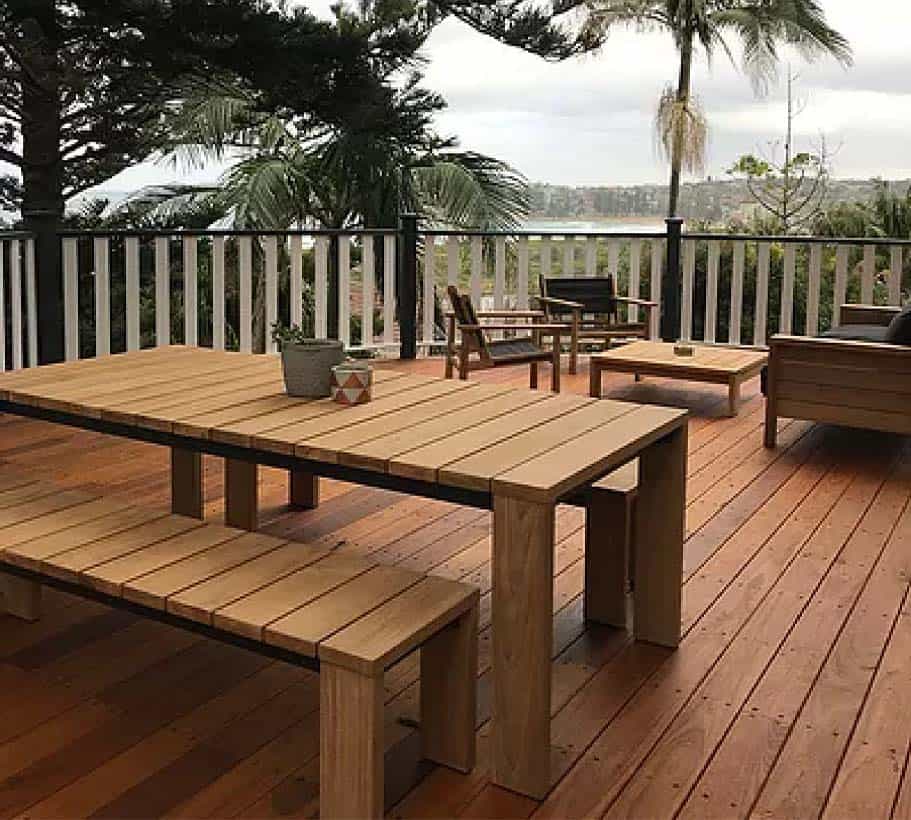
However, wood decking requires regular maintenance. When exposed to the elements, it is susceptible to rot, splintering, and fading. Wood decking must be stained or sealed every year to ensure its longevity.
Furthermore, wood decks can attract pests such as termites and carpenter ants, which can cause damage over time.
Despite these drawbacks, many homeowners prefer wood decking for its natural look and feel.
Pros and Cons of Composite Decking
Composite decking is a popular alternative to wood. It is made from a mixture of wood fibers and recycled plastic, offering the best of both worlds.
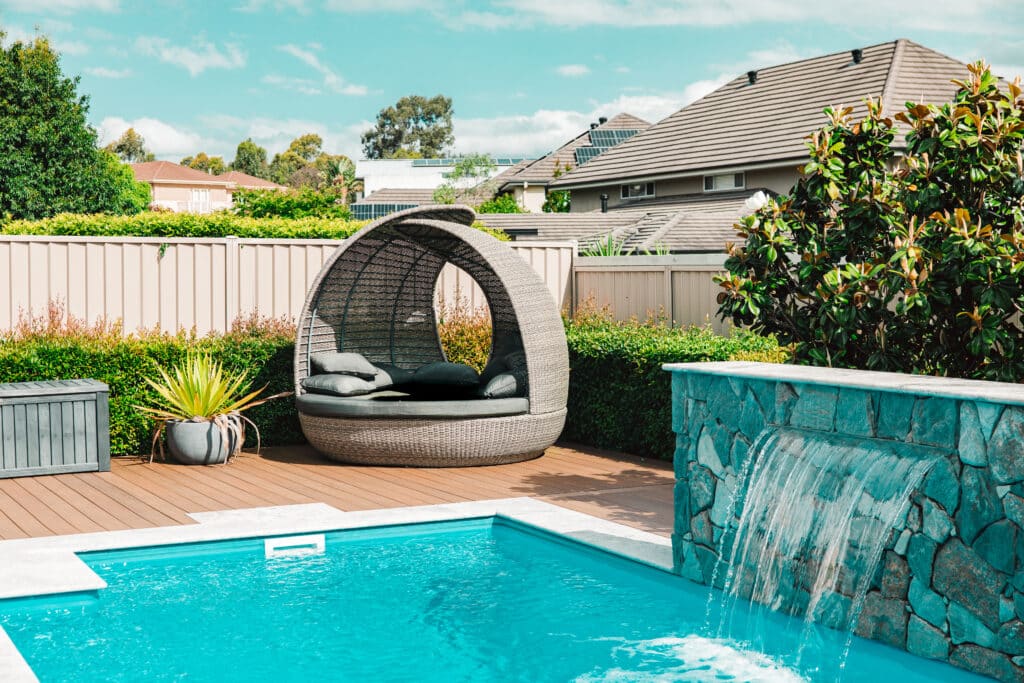
One of the main advantages of composite decking is its low-maintenance nature. Unlike wood, composite decking does not require staining, sealing, or painting. It is resistant to rot, insects, and fading, making it a durable choice for outdoor spaces.
In addition to its practical benefits, composite decking comes in various colours and styles. Whether you prefer a traditional or modern look, there is a composite deck to suit your taste.
However, it is important to note that composite decking can be more expensive upfront compared to wood. Additionally, composite decks may get hot under the sun, so it is advisable to use rugs or mats in areas exposed to direct sunlight.
Pros and Cons of PVC Decking
PVC decking is another low-maintenance and durable option for your deck. Made from 100% recycled plastic, PVC decking is resistant to rot, insects, and fading.
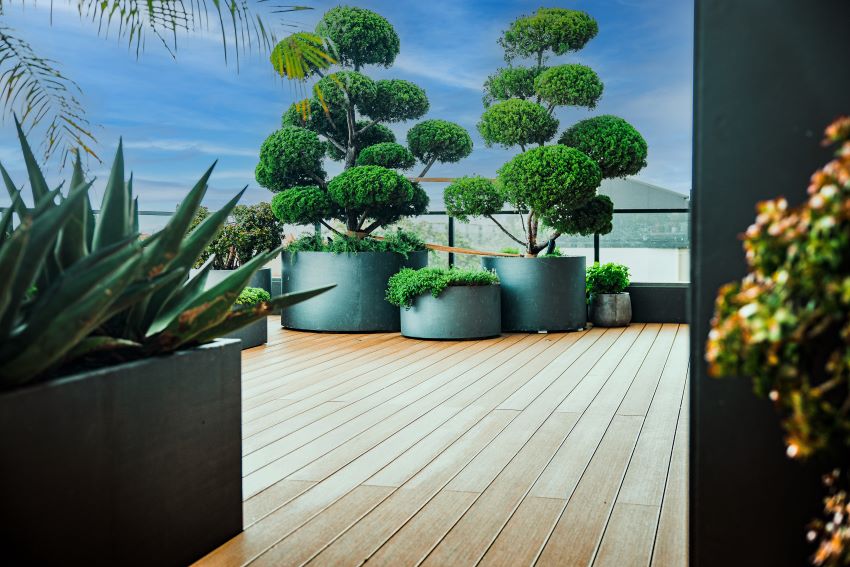
It is also highly durable and can withstand harsh weather conditions. One of the most significant advantages of PVC decking is its longevity. It can last significantly longer than wood or composite decking, making it a wise investment in the long run.
PVC decking is considerably cooler to the touch than timber or other composite deck materials. It can be a good choice for decks that are exposed to a lot of sunshine during the day.
However, PVC decking needs to have the natural appearance of wood. It has a more synthetic look and may only be someone’s cup of tea.
Additionally, some PVC decking can be slippery when wet, posing a potential safety hazard. Despite these drawbacks, PVC decking is an excellent choice for those seeking a low-maintenance option with exceptional durability.
Pros and Cons of Aluminum Decking
Aluminium decking is a relatively new option on the market, but it is quickly gaining popularity.
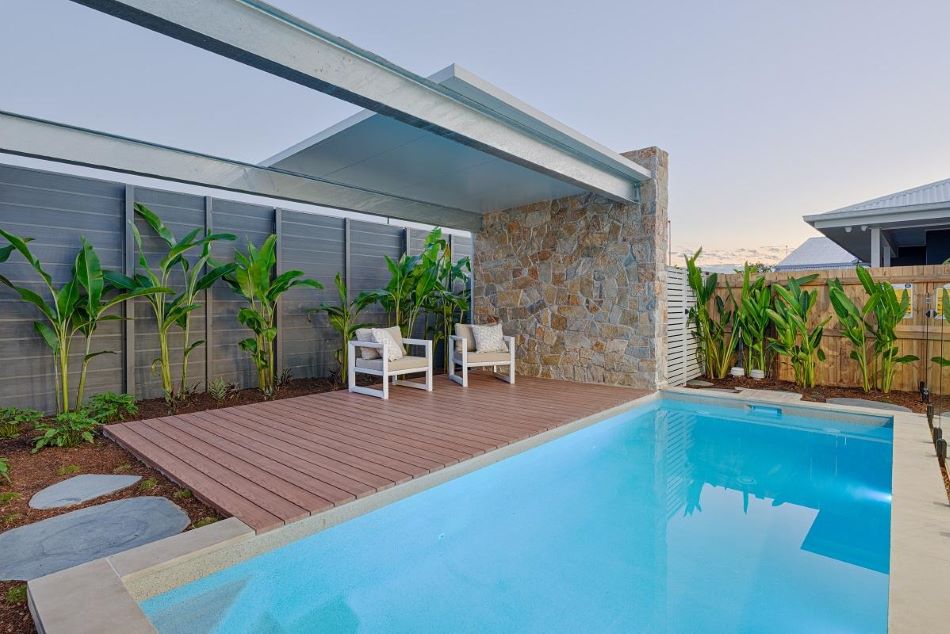
One of the most significant advantages of aluminium decking is its durability. It is resistant to rot, insects, and fire, making it a safe and long-lasting choice. Aluminium decking is also low-maintenance, requiring minimal upkeep.
Another benefit of aluminium decking is its lightweight nature. It is easy to install and handle, making it a convenient option for DIY enthusiasts.
However, aluminium decking can be more expensive than other materials, such as wood or composite. Additionally, it can become hot to the touch under direct sunlight, so it is important to be cautious when walking on it barefoot. However, it dissipated heat more readily than timber or composite decking.
Pros and Cons of Polyurethane Resin Decking
Millboard decking is another type of composite deck board. It is made from Polyurethane resin (not plastic) with mineral stone flour commonly referred to as Resin, mineral composite (RMC). It also contains glass fibres to give extra exceptional strength.
It replicates the natural beauty of wood with its realistic grain patterns, colours, and textures. The boards replicate the natural beauty of wood with their realistic grain patterns, colours, and textures.
It is a very durable product with a very high slip resistance (P5) making it extremely suitable for use around pools and waterways.
The deck boards are manufactured from a blend of recycled materials, including plastics. This makes it eco-friendly as it contributes to the reduction of demand for virgin materials. And unlike wood, it maintains its colour and appearance for a long time.
There are only a few cons for this decking type (and brand). The initial cost is substantially higher than traditional timber products. However, this cost is offset by the virtually zero maintenance required over its lifespan and the quicker installation process when compared to other deck boards.
While it is generally durable, heavy or sharp objects could potentially scratch the surface. This is not limited to Millboard deck products – it generally applies across any decking product.
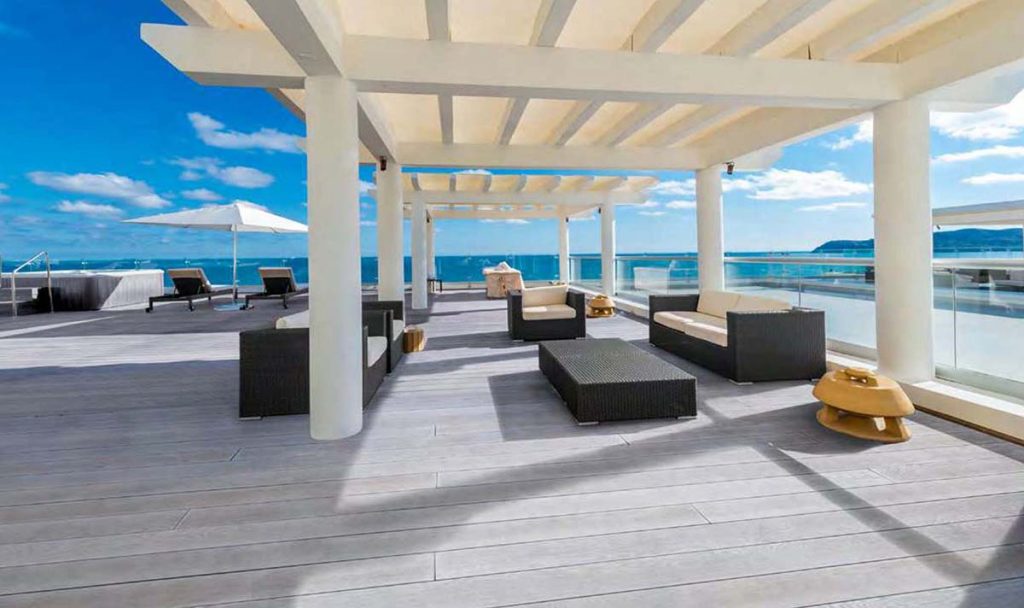
Remember that the pros and cons of Millboard decking can vary depending on individual preferences, location, and usage. It’s essential to consider your specific needs and priorities when deciding if Millboard decking is the right choice for your project.
Factors to Consider When Choosing Deck Materials
When choosing the right deck material for your needs, several factors must be considered. Firstly, think about the climate in your area. If you live in a region with extreme weather conditions, such as high humidity or freezing temperatures, you need to choose a material that can withstand these conditions.
Secondly, consider the level of maintenance you are willing to undertake. If you prefer a low-maintenance option, composite, PVC, aluminium, or vinyl decking may be more suitable for you. However, wood decking may be a better fit if you enjoy staining and sealing.
Lastly, think about your budget. Different deck materials come with different price tags. While wood decking may be more affordable upfront, it requires ongoing maintenance costs. On the other hand, composite, PVC, aluminium, and vinyl decking may have a higher initial cost but require minimal maintenance in the long run.
Comparing the Cost of Different Deck Materials
The cost of deck materials varies depending on the type of material, quality, and brand. Here is a general overview of the average price per linear metre for each type of decking material:
– Timber decking: $10 – $50
– Composite decking: $15 – $40
– PVC decking: $22 – $32
– Aluminum decking: $26 – $35
It is important to note that these prices are approximate and may vary based on location and other factors. Consider other expenses such as labour, installation, and additional features or accessories when budgeting for your deck.
Maintenance and Durability of Different Deck Materials
Maintenance and durability are crucial factors to consider when choosing a deck material.
Wood decking requires regular maintenance, including staining, sealing, and occasional repairs. Please maintain wood decking to avoid rot, splintering, and fading.
Composite, PVC, and aluminium, on the other hand, require minimal maintenance. These materials are resistant to rot, insects, and fading, making them highly durable. Regular cleaning with soap and water is usually sufficient to keep these decks looking their best.
When it comes to durability, PVC and aluminium decking are the top contenders. They offer exceptional resistance to the elements and can last significantly longer than wood or composite decking. However, all deck materials have their lifespan, and proper maintenance is essential to maximise their longevity.
Conclusion: Choosing the Right Deck Material for Your Needs
In conclusion, choosing the suitable deck material involves considering various factors such as aesthetics, maintenance, durability, and budget. Wood decking offers a natural and classic look but requires regular maintenance. Composite decking is low-maintenance and comes in many styles but can be more expensive upfront. Aluminium decking is durable and lightweight but can be more expensive. Vinyl decking is low-maintenance and comfortable to walk on but may have some movement and noise.
By understanding the pros and cons of each option, you can make an informed decision that suits your needs, budget, and personal preferences. Whether you prioritise aesthetics, durability, or low maintenance, there is a deck material out there that will enhance your outdoor space and provide years of enjoyment. So, take your time, explore your options, and build the deck of your dreams.
I’d like some more information


